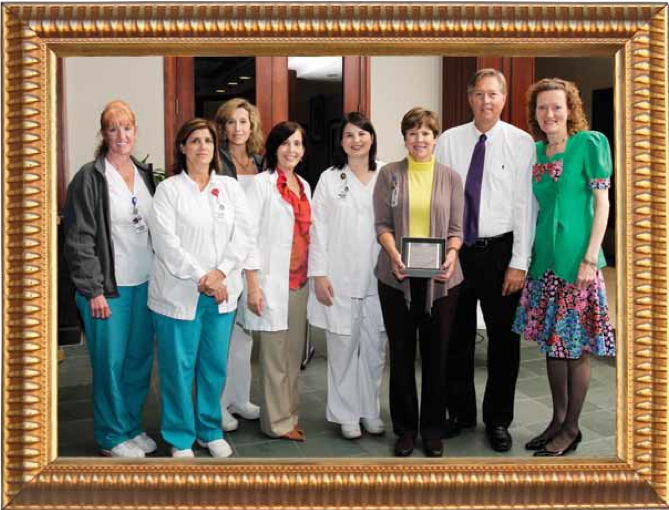East Jefferson General Hospital Receives National Nursing Award
EJGH awarded 2011 Award for Nursing Certification Advocacy.
 The American Board of Nursing Specialties Awards and Recognition Committee selected East Jefferson General Hospital, Critical Care Division, in Metairie as the recipient of the 2011 Award for Nursing Certification Advocacy. “The award is about high standards for excellence in patient care and we are excited and proud to provide our community with expert nursing care,” says Nicole Jones, clinical nurse specialist for critical care at East Jefferson General Hospital.
The American Board of Nursing Specialties Awards and Recognition Committee selected East Jefferson General Hospital, Critical Care Division, in Metairie as the recipient of the 2011 Award for Nursing Certification Advocacy. “The award is about high standards for excellence in patient care and we are excited and proud to provide our community with expert nursing care,” says Nicole Jones, clinical nurse specialist for critical care at East Jefferson General Hospital.
This division is a large team. “It consists of an intensive care unit, coronary care unit, three telemetry or step-down critical care units, and our respiratory department also contains some nurses in the critical care department,” Jones says. These nurses are unique as they help a lot of patients with acute episodes and emergencies. “Patients and families require care so sometimes we spend time giving as much care and support to the families and loved ones as we do the patients.”
The award is a prestigious honor that commends the approximately 24 percent of direct caregivers and 80 percent of the nursing management in the Critical Care Division who are certified. “When you become a registered nurse, you graduate from school and take a board examination to obtain your licensure but with a specialty certification, you go through a process where you study in a specialty area of nursing after you have been practicing for one to two years and then take an examination that validates advanced knowledge in that specialty,” says Jones.
Most noteworthy is the division’s organizational culture. “We reimburse nurses for their certification exams, provide review courses free of charge and have study groups,” says Jones. East Jefferson General Hospital prefers credentials in hiring. They provide paid time off to attend certification review and continuing education courses, and they have established a certification resource loan program to provide study materials. Nurses can also receive pay differentials with certification and can draw motivation from knowing that specialty nursing certification is a mandatory criterion on the clinical ladder. Participating in regional and national professional organizations is supported and events are held to honor certified nurses.
There are walls of honor outside every nursing unit so patients and families can see which nurses are certified in their specialty. “We spend a lot of time trying to encourage and support nursing certifications because we know it is a mark of excellence and nursing expertise for our patients,” Jones says. For the rest of their career, these nurses obtain more continuing education than typical registered nurses. “You are required to stay abreast of all of the latest education, evidence-based practice, research and new information coming out in your specialty,” says Jones.
Having the special certification does make a difference in practice. Jones says the American Association of Critical Care Nurses has posted a poll on their website that shows three out of four people said they would rather go to a hospital that has a high percentage of certified nurses. Jones says nurses are grateful for the award but accept it humbly. “It is an honor and a professional accomplishment that we see as a mark of excellence, which is why we are so pleased,” she says.
Dr. Mark Peters, President and Chief Executive Officer of East Jefferson General Hospital, recognizes the difference of having specialty nursing certification. He sees that it aids with professional development and has contributed to improved patient outcomes. “In evaluating our workforce and the health-care needs of our community, it is evident that nurses who are certified in their specialty are especially poised to meet the demands of today’s health-care environment,” says Peters.
The nurses at East Jefferson General Hospital find their job rewarding and intend to continue providing top quality care. Says Jones, “We have an opportunity every day to make a difference in patients’ lives especially in the Critical Care Division.”
